Guinea pig owners frequently deal with poopy pets. It can be annoying to clean up after your guinea pig only to find droppings all over the cage a short while afterward. You may find yourself wondering, “why does my guinea pig poop so much?” as a result of how frustrating it is.
Pooping also varies from one guinea pig to the next. Because of this, monitoring might initially take a lot of work, especially if you’re keeping multiple together.
However, learning how frequently a guinea pig should go will let you set expectations, plan your cleaning procedure, and recognize what is typical and what can be a problem.
To assist you in maintaining your home and helping ensure you have a healthy guinea pig, we’ll delve into how often guinea pigs poop.
What affects how much your guinea pig poops?
A guinea pig in good health should poop up to 100 times daily. This figure can fluctuate because each guinea pig is different, and it ultimately depends on a few things like age, weight, nutrition, and exercise.
However, if your guinea pig poops less than that, or the daily average is below 50, it may be a sign of health problems; after all, it’s important that your guinea pig poops regularly.
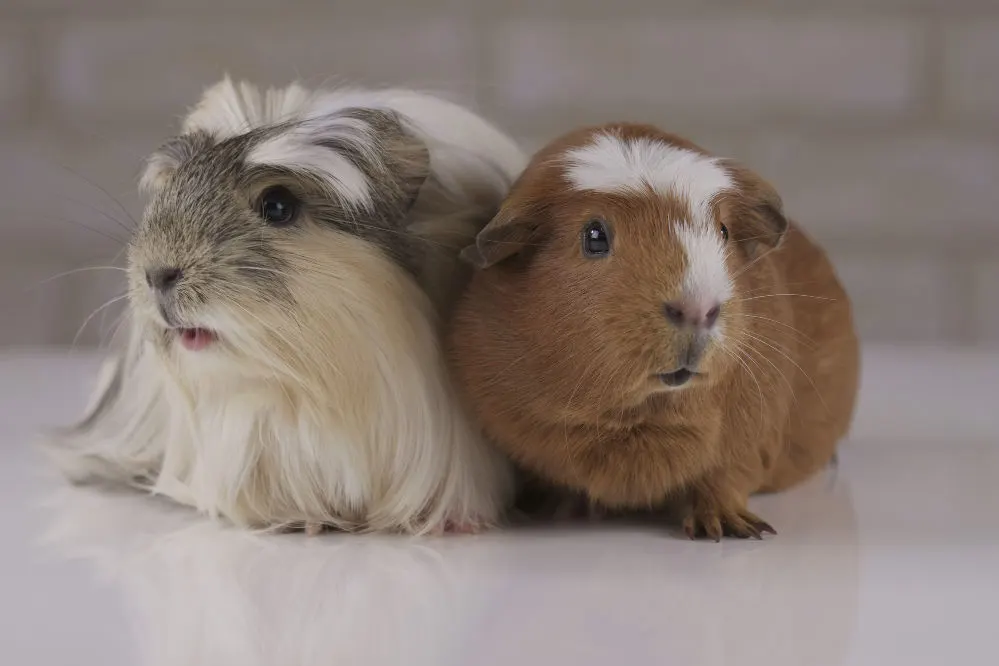
As a result, in addition to the quality of the food that these small animals eat, their age and health also impact the quantity and quality of their excrement. We’ll have a deeper look at each factor below.
Age
Guinea pigs often poop a little less as they age. They can’t consume food as quickly as they used to because their digestive system slows down as they get older.
The digestive tract cannot break down food as quickly as it could when they were younger. However, this is nothing to worry about because it’s only a regular part of their aging process. Nothing to worry about as long as your guineas continue to eat and drink normally, that is.
If you notice your older guinea pig is pooping less, it may just be part of the aging process.
Diet
Guinea pigs are among the messiest pets and can create up to 1/4 cup of feces daily, in good health. Guinea pigs’ bodies are healthy and functioning because they are dedicated to a never-ending cycle of eating and pooping.
Guinea pigs create precisely the same quantity of waste in relation to their meal intake. If your guinea pig’s diet is balanced and nutritious, you shouldn’t be concerned about it. They will poop as frequently as necessary.
Your guinea pigs will start to poop less if they consume too many treats or have an unbalanced diet (or insufficient fiber and vitamin C). For a guinea pig to have a healthy body and healthy poop, fiber and vitamin C are crucial.
Piggies also obtain fluids from the vegetables they consume. However, clean water plays a crucial function in cavies’ digestive systems and aids in keeping things moving. Therefore, you should ensure that your pets always have access to enough water, especially during hot weather.
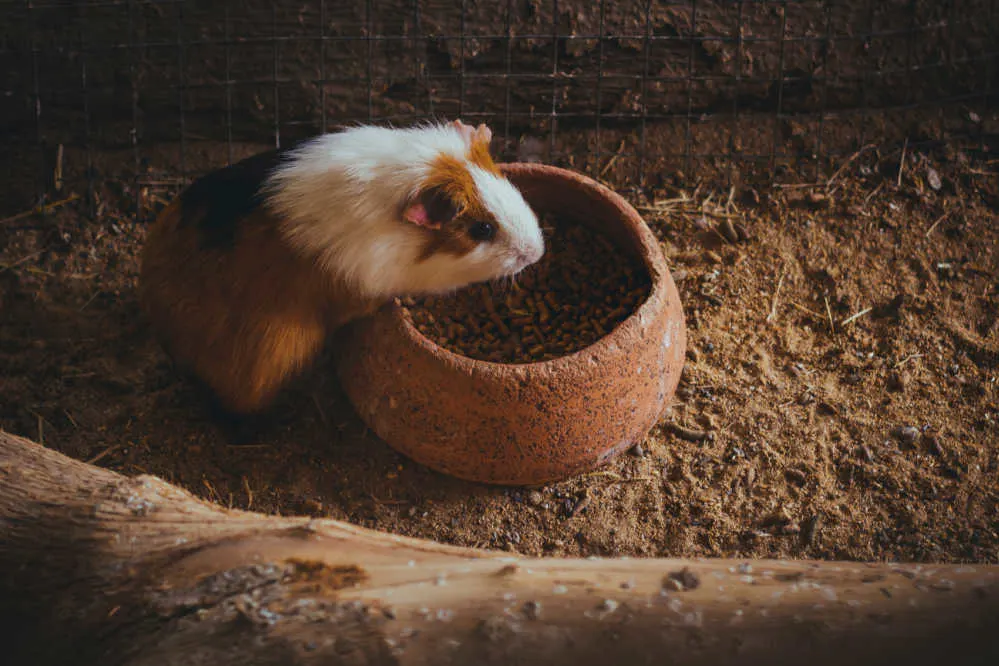
Set out a daily, piggie-friendly buffet of fresh vegetables , vitamin C-enriched pellets, and moderate amounts of fruit. A daily treat or two is acceptable, but ensure they aren’t allowed to continuously munch on their favorite, delectable treats.
Activity
Exercise is one of the main determinants of how much guinea pigs poop. Your cavy will poop more the more they move, and less movement will result in less pooping.
As a result, if a guinea pig needs more space to play and explore, it will defecate less than guinea pigs with larger enclosures and more toys that encourage exploration and enjoyment.
If they exercise daily, this also means that guineas need to eat more frequently. The more food they have to process, the more feces you’ll see around their cage.
However, this is terrific news. You want an energetic and healthy piggie that is zooming around in its cage, moving around its huts, and pooping like its very life depends on it.
What should your guinea pig’s poop look like?
Cecals and ordinary feces are the two forms of excretions that guinea pigs create, yet no one is certain why they have these peculiar pooping habits. To a pet parent, being able to tell the difference between the two is crucial since the consistency of guinea pig excrement indicates this small animal’s health.
Your guinea pig should generally eliminate as much waste as they consume. It’s critical to understand the cause if you’ve noticed a variation in your guinea pig’s toilet routine.
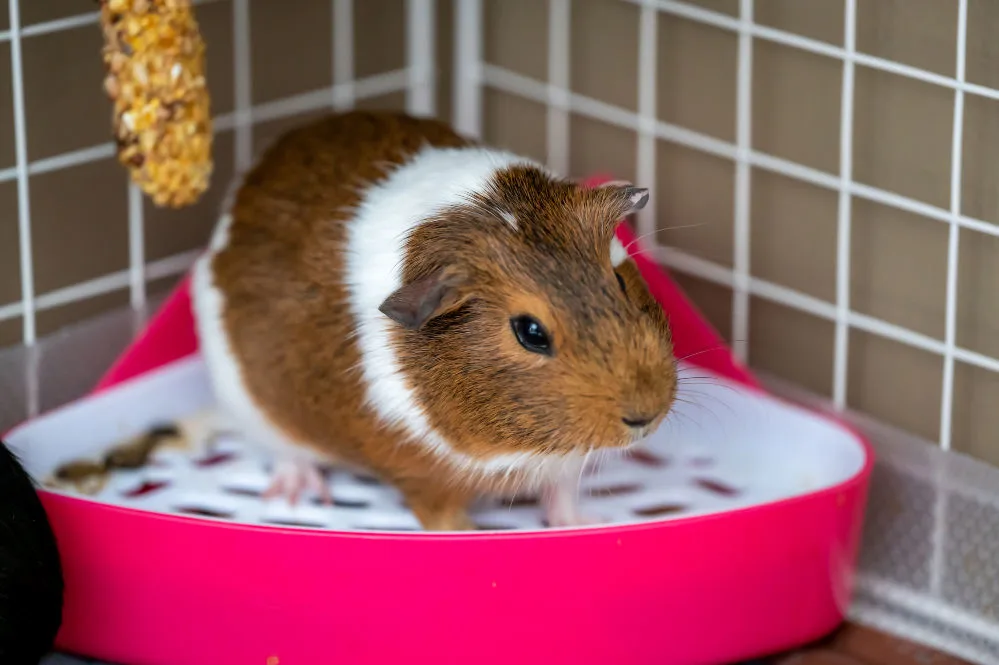
The frequency, size, shape, color, smell, and consistency of your guinea pig’s poop, as well as any changes, are all warning indicators that their health may be compromised.
Normal poop has a fat, cylindrical appearance. These poops are uniform, rounded, and range in size from one to two centimeters. They should also be smooth, sturdy, and well-formed. Ordinary guinea pig poop has a medium-dark brown color and a bit of a sheen if it’s just been passed.
Different types of guinea pig poop
Guinea pigs are excellent at concealing illness, which is an essential consideration while maintaining them. Additionally, they do not exhibit typical signs of disease like vomiting or inactivity. Learning how to read guinea pig poop is the primary method of spotting an illness.
Normal poop
The hue of healthy poop is often between medium and dark brown. A typical guinea pig excrement ought to be oval-shaped and uniform in consistency.
When guinea pigs stomp on them, they shouldn’t fall apart but shouldn’t be dry. Due to the hay they digest, the texture could feel gritty. There also shouldn’t be a strong scent to the poop.
Bloody poop
Don’t hesitate to seek medical attention if your guinea pig has bloody poop. It may indicate a significant rip or obstruction in their digestive system.
This may also be a symptom of problems with the urinary system, including infections, bladder stones, or even reproductive issues like ovarian cysts.
Green poop
Don’t freak out if you see green guinea pig waste. Cecal pellets, another name for this kind of feces, are a typical byproduct of your guinea pig’s digestive process.

Coprophagic animals include guinea pigs. This means that they consume certain types of their own poop. As repulsive as it may sound, guinea pigs eat these particular pellets because they contain vital nutrients that guinea pigs need, such as protein and fiber. Most of the time guinea pigs will consume these green pellets directly from their hindend so you often won’t even see them.
Tear-shaped poop
Teardrop-shaped poop can indicate that your guinea pig has a digestive problem. Every guinea pig’s diet must contain fiber. Therefore, if you notice teardrop feces, your pet may not be eating enough fiber.
Ensure your guinea pigs have unrestricted access to fresh, clean mounds of hay. If their hay is left dirty, guinea pigs frequently will avoid eating it . To pique their hunger, incorporate some guinea pig-safe fodder, such as dandelions, marigolds, or reed grass.
It’s crucial to remember that poopwith a tear-like appearance can also be a sign of dehydration. Keep an eye on your pet’s water intake and add some hydration-rich foods to their feed, such as cucumbers.
Dry, crumbly, and light-colored poop
It’s crucial to look into guinea pig feces that are crumbly, dry, and light brown. This can be a sign of dehydration. Dehydration can become lethal when ignored.
The excrement of normal, healthy guinea pigs becomes dry after a while. However, if they are dehydrated, the stool is dry immediately after excretion.
If there is no drinkable water available, dehydration may occur. It might also happen as a result of hot weather. Make sure your piggies can reach their water by getting them a good-quality water bottle.
Soft and smelly poop
A guinea pig’s soft and mushy excrement frequently suggests serious health problems. For the majority of the time, this indicates that they have an infection. This kind of excrement stinks up the place and can even be watery.
Other problems brought on by diarrhea include dehydration and appetite loss. They may often develop more serious issues as a result of this.
The first step in getting your pet back to normal health is hydration. They also might need a change in diet. Fresh vegetables could aid in regaining their health.
Small
Poop that is smaller in size can indicate that a guinea pig has not been eating well lately. Gut stasis, or when digestive motion occurs, might happen if your pig has been eating less or foods low in fiber. Critical care syringe feeds can assist in providing your guinea pig with the nutritional boost they require.
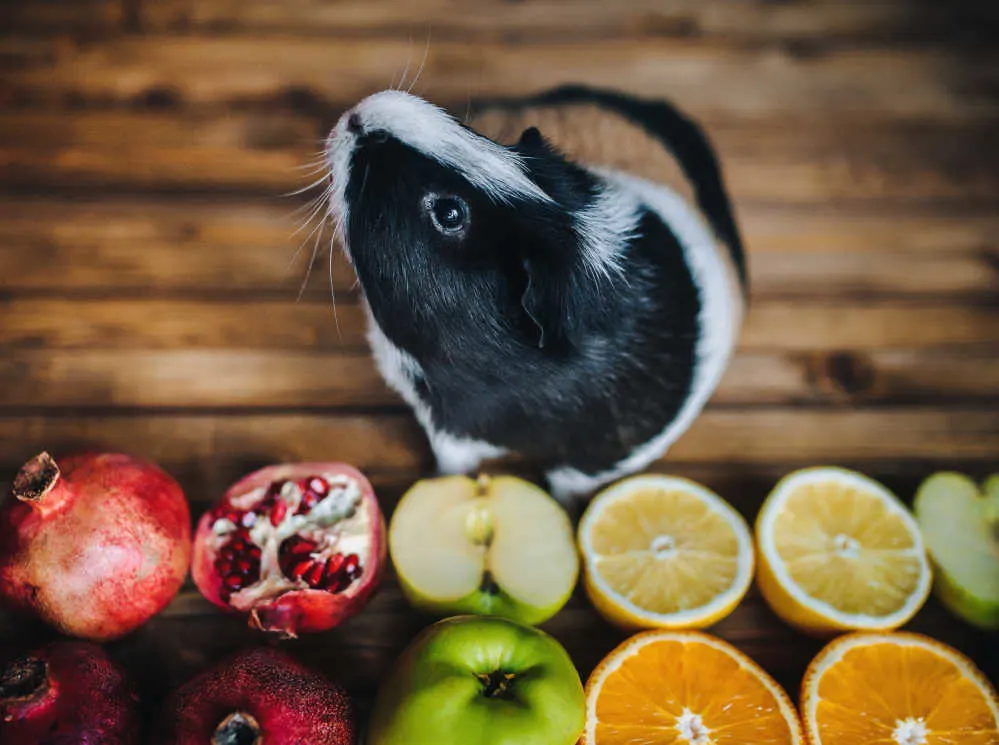
Clumpy
Older pigs with weaker rectal muscles frequently have clumpy feces. Poop may get distorted or compressed as a result of this.
However, clumpy guinea pig excrement may also indicate digestive problems like constipation. Low-fiber diets and inadequate hydration both contribute to constipation.
As a result, guinea pigs may struggle or act uncomfortable when using the restroom. To maintain your guinea pigs’ health and regularity, fresh water, unlimited hay, a ration of fruits and vegetables, and daily exercise are all recommended.
It is crucial to speak with your vet for a more thorough evaluation if this persists for more than a day.
How often should you check their poop?
Daily spot cleaning for your piggy’s cage is a fantastic idea. They will appreciate it if you keep their environment clean and comfortable!
Checking your guinea pig’s droppings as part of your cleaning routine is one of the best ways to ensure they are doing well. This way, you can keep an eye on your guinea pig’s health and, if required, see your veterinarian if you notice anything that doesn’t seem right.
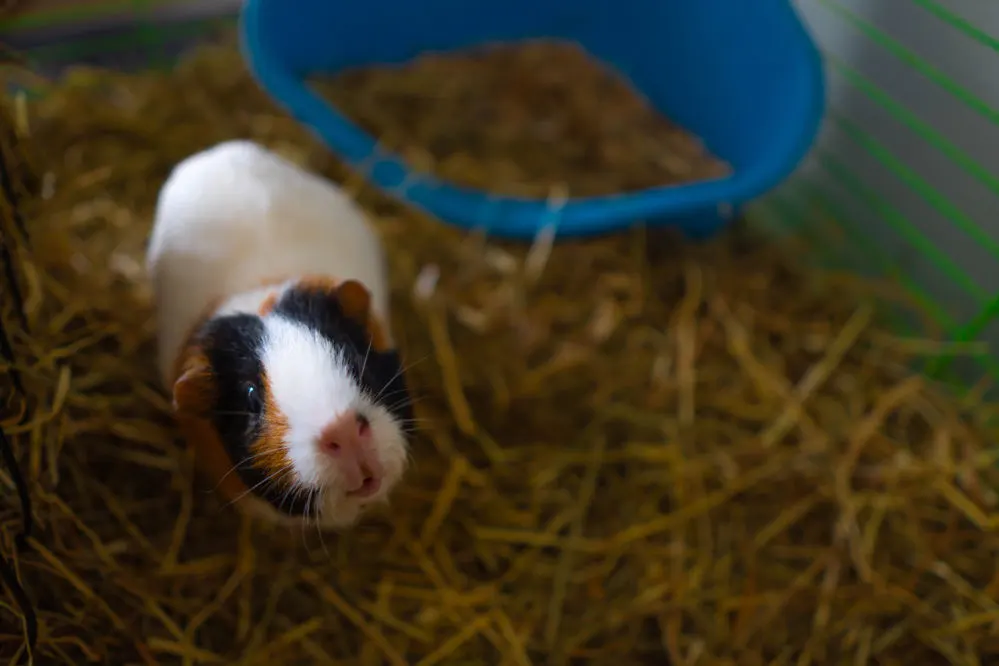
Cleaning tips for guinea pig poop
In addition to feeding your guinea pig nutritious food, you should also take care of their hygiene. Every day, ideally twice a day, spot-clean your guinea pig’s cage.
Refilling water bottles, removing dirty hay, and replenishing with fresh bedding and hay are all included in spot cleaning. That also includes collecting and removing as much waste as possible from your guinea pig’s cage.
Additionally, depending on how many guinea pigs you have, you should clean the entire cage at least once per week.
As feces remain on the surface, fleece liners are great guinea pig bedding options and make monitoring your furry friend’s poop much simpler. It’s also easy to set up your little friend’s cage with fleece liners.
So, how often do guinea pigs poop?
When you consider everything, it becomes apparent that guinea pigs poop a lot – and doing so is often an indicator of them being healthy and having normal bathroom habits.
You have no choice but to smile since you are a wonderful guinea pig owner who takes excellent care of your furry little friend! Just be ready to establish a reliable cleaning schedule. Piggies are worth it, after all.
Steph Dyson is a travel journalist by trade but a lover of all small pets. She’s been a pet mum to everything from gerbils to guinea pigs, rabbits to hamsters, and fish to dogs of all shapes and sizes. She wants to share her years of experience with small pets and make Small Pet Guides the go-to website for pet owners seeking information and care advice.

